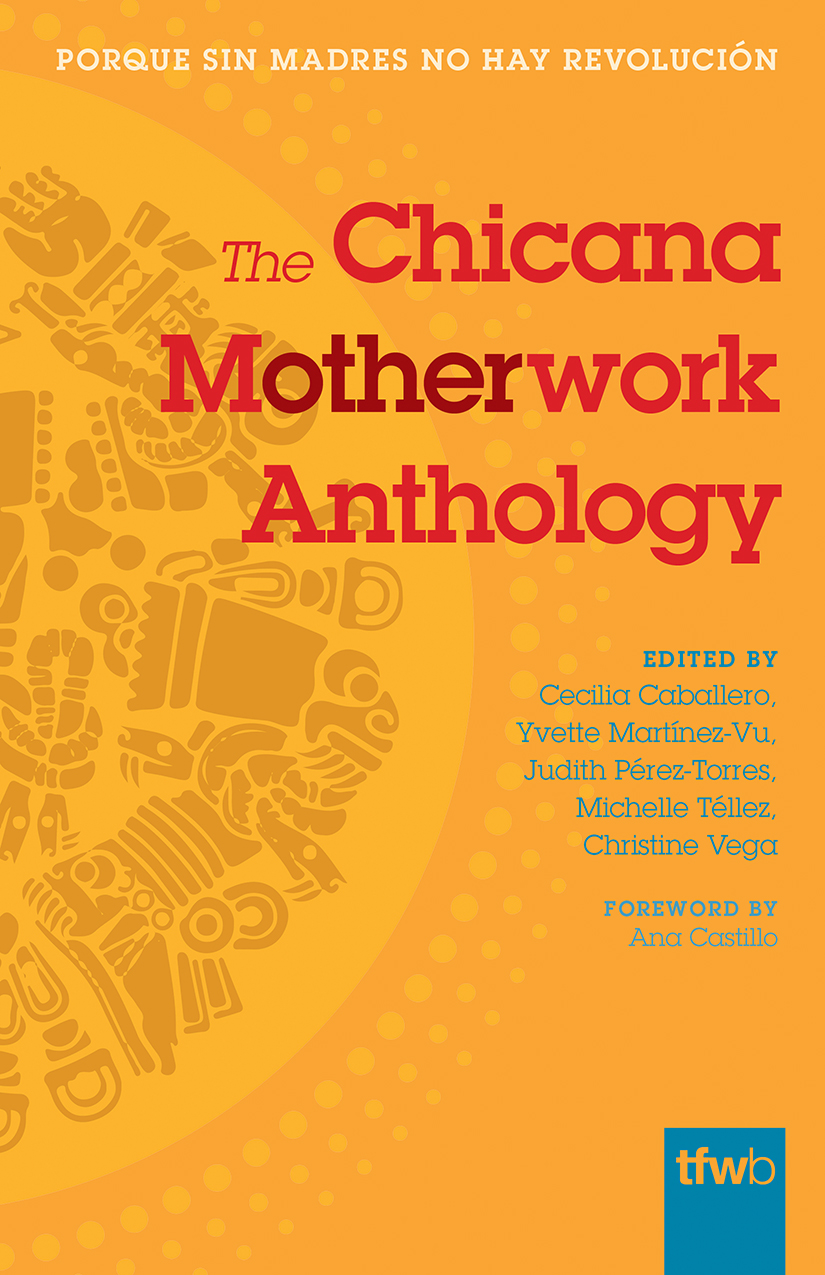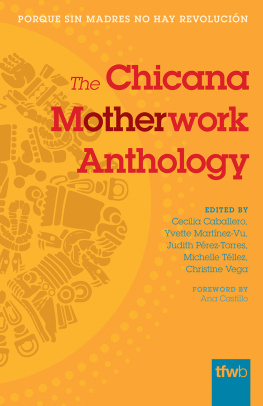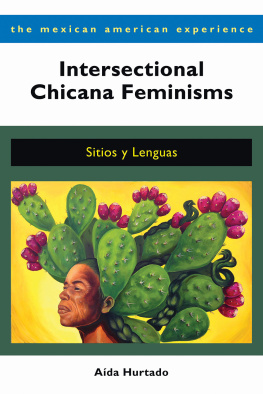
The Chicana M(other)work Anthology
The Feminist Wire Books
Connecting Feminisms, Race, and Social Justice
Series Editors
Monica J. Casper, Tamura A. Lomax, and Darnell L. Moore
Editorial Board
Brittney Cooper, Aimee Cox, Keri Day, Suzanne Dovi, Stephanie Gilmore, Kiese Laymon, David J. Leonard, Heidi R. Lewis, Nakisha Lewis, Adela C. Licona, Jeffrey Q. McCune Jr., Joseph Osmundson, Aishah Shahidah Simmons, Heather M. Turcotte
Also in The Feminist Wire Books
Them Goon Rules: Fugitive Essays on Radical Black Feminism, by Marquis Bey
The Chicana M(other)work Anthology
Porque sin madres no hay revolucin
Edited by
Cecilia Caballero, Yvette Martnez-Vu, Judith Prez-Torres, Michelle Tllez, and Christine Vega
Foreword by
Ana Castillo

The University of Arizona Press
www.uapress.arizona.edu
2019 by The Arizona Board of Regents
All rights reserved. Published 2019
ISBN-13: 978-0-8165-3799-0 (paper)
Cover design by Leigh McDonald
Cover art by Christine Vega
Library of Congress Cataloging-in-Publication Data
Names: Caballero, Cecilia, editor.
Title: The Chicana motherwork anthology : porque sin madres no hay revolucin / edited by Cecilia Caballero [and 4 others] ; foreword by Ana Castillo.
Description: Tucson : The University of Arizona Press, 2019 | Series: The Feminist wire books : connecting feminisms, race, and social justice | Includes bibliographical references and index.
Identifiers: LCCN 2018038444 | ISBN 9780816537990 (pbk. : alk. paper)
Subjects: LCSH: Mexican American mothersSocial conditions. | Mexican American womenSocial conditions. | Women scholarsSocial conditions. | Feminism.
Classification: LCC E184.M5 C394 2019 | DDC 305.48/86872073dc23 LC record available at https://lccn.loc.gov/2018038444
Printed in the United States of America
This paper meets the requirements of ANSI/NISO Z39.48-1992 (Permanence of Paper).
Contents
Katherine Maldonado
Gabriela Corona Valencia
Gretel H. Vera-Rosas
Grace Gmez
Nereida Oliva and Hortencia Jimnez
Trina Greene Brown
Monica Hernndez-Johnson, Shahla Fayazpour, Sandra L. Candel, and Ravijot Singh
Victoria Isabel Durn
Cristina Herrera and Larissa M. Mercado-Lpez
Vernica N. Vlez
Alma Itz Flores
Andrea Garavito Martnez
Irene Lara
Gabriela Spears-Rico
Corina Benavides Lpez
Mara Chavez-Diaz
Nora Cisneros, LeighAnna Hidalgo, Christine Vega, and Yvette Martnez-Vu
Rose G. Salseda
Foreword
It is with enormous pleasure that I address the collection of scholarly writings included here. As a mother who raised her son for most of his life on her own, a writer and an educator, the daughter of a Mexic-Indian woman who took care of her family by working on assembly lines for more than four decades in Chicago, and as a Xicana, I welcome this volume wholeheartedly. In a way, it feels like being invited to a long-awaited sit-down luncheon or one of the informal potlucks I warmly recall with compaera-activists in days gone by. The experiences we shared at those gatherings about the work we had done all weekfighting the good fight as mujeres en la luchawere not formally documented but fomented in part what would eventually be known as Chicana feminist thought.
To think is the key phrase here. Cogito ergo sum, as Descartes concluded. And in the end, it was and remains this singular linea few words I was surely never familiar with at the start of the journeythat led me to take a road that no one, and surely nothing before such analysis formulated, had meant for me. And yet, whether rarely or disappeared, my own road had been tracked before.
If time is relative, then let us assume the groundwork for this collection was set by generations of prior thinking mothersnot all silent. Not at first, and not all. But the fundamental perspective embraced by the Chicana/Xicanista/Xicanx, holistic and inclusive (bodymindspirit), runs antithetical to the world we inhabit. More often than not, our proposals and efforts are diminished and even eventually dismissed. Most often, instead of seen as worthwhile reading for anyone interested in social change, our writings are reduced in importance with regard to the status quo, relegated to ethnic studies or womens and gender studies.
Contrary to the stubborn notion that we are a quiet, even complacent demographic, we have been speaking out for a very long time.
The conquest took place more than five centuries ago. Iztapapalotl wailed one night, My children! What will become of my children? It was a recorded omen of which the Emperor Moctezuma took note and rightly so. He heard a mothers cry and identified it with being representative of his empire. But on a pragmatic level, it was in fact women and their children who would be first most harshly oppressed as a result of the European invasion. The blood on these landsSouth, North, and Central America and the attendant islands near and aroundthe sweat and tears of original peoples; the buried placentas and ombligos of newborns; the wails of madres sufridas and the war cries of guerrilleras; the prayers of sacerdotas, brujas incantations, remedios de curanderas, y en hecho y en resumen, las madres-diosaswhether their words were written or rumored, echoed or muffled, all have served as the foundation of what we read in the following pages, as well as all the action produced by women of consciousness, day in and day out. From the decision to return to the classroom while our babies are still being breastfed, because we feel the need to continue guiding students; to running for public office while our children are dealing with adolescent angst at home; to volunteering with community organizations or human rights groups when our children no longer require our daily vigilanceMother-Scholars are not all things to all at all times, but we are consistently conscious of our desire and will to leave the world a little less askew than how we came to it.
Consequently, the feminist who also identifies as a Chicana often goes ignored by dominant society. Despite our efforts on the part of thinking Brown women, until the mid-eighties (and I would put forth, to an extent in the present), the dialogue on the subject of feminism remains predominantly between Black and white people.
It was the desire and need to enter the dominated Black and white feminist dialogue and create a discussion that led me from the poems and novels I endeavored to investigating the various components that made up our identities: collective history; relationships as mestizas with the United States and Mexico; the legacy of religion, especially Catholicism; the ongoing bombardment and effects of racism against People of Color as the result of colonialism; and how writing as a relatively new form of communication for us as a group would help us unite in our efforts for social change. Although other like-minded writers were few, they were emerging in the eighties when I began my endeavor. We became a small but determined chorus. In the book that ensued, Massacre of the Dreamers: Essays on Xicanisma, I called a chapter Un Tapiz, remarking on three books (one was my first novel) by three Chicanas. As I saw it, each book was addressing from a different tack the multilayers of patriarchal rules that had kept women of Mexican heritage out of the upper ranks of the public sphere, but more often, out of the public sphere altogether. We were not the most recent immigrant population, for the most part, even if we were first generation; we were not new to these lands. In terms of population, there were many of us, but whether in the media, government, or most prominent places, we were kept out.
Next page





